Why Is Protein Powder So Expensive? (4 Tips to Save Money)
Author:
Unlock your full potential by engaging with our experts and community! Have questions about your fitness journey or looking for expert advice on weightlifting techniques? Don’t hesitate — leave a comment below and Oleksandr Maksymenko will provide a personalized answer and insights to help you reach your goals.
Torokhtiy is reader-supported. Some links are affiliate links, and we may earn a commission at no extra cost to you. See our disclosure page for details.
Have you ever wondered why is protein powder so expensive? Me too. I did some research on that so you don’t have to. Below you can find information on how much does a protein powder cost and what are the factors influencing the price.
I also compared two protein powders, with different price tags to give you an idea what to look at before making a decision. Finally there are 4 easy steps that anyone could take to save up a little bit.
Why is protein powder so expensive? – The price reflects the high cost of the main ingredient – protein. Other factors such as increased demand, manufacturing costs, inflation and global economy in general play a role.
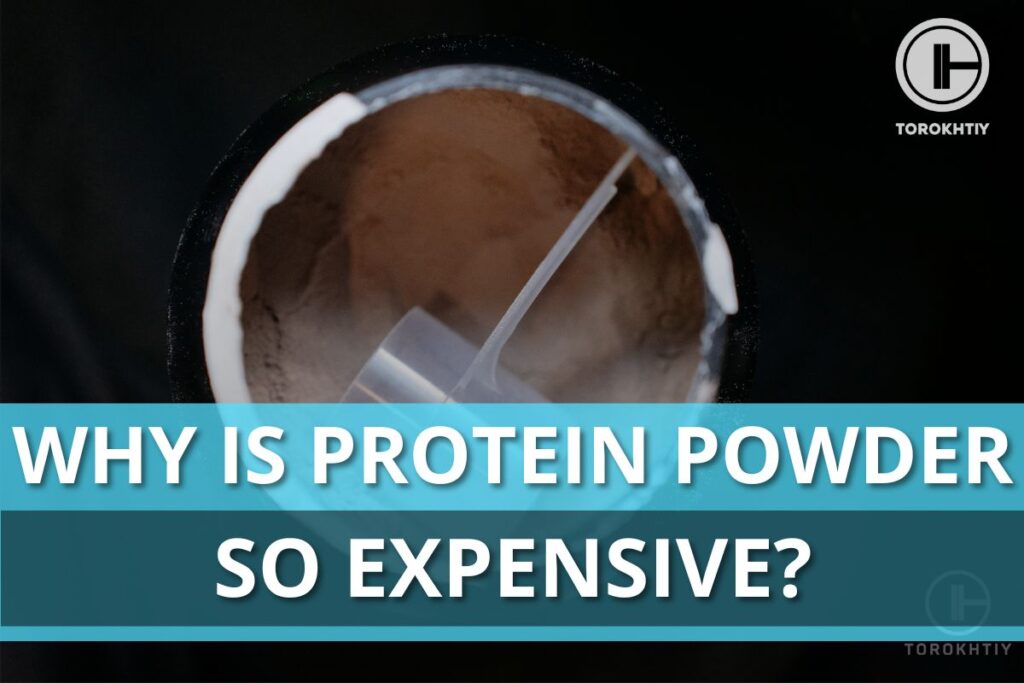
Cost of Protein Powder – Overview
Unlike fats and carbs, protein is a pricy ingredient that provides essential nutrients for the human body. Protein-rich foods, such as meat and poultry, fish and dairy, pulses and mushrooms are more expensive to produce than fruits and vegetables, for example.
Protein powder undergoes several processing steps to remove the fat and lactose from the whey protein, resulting in a concentrated protein. The cost of this processing can be high due to the equipment, energy, and labor required. Additives such as flavors, minerals and vitamins also raise the cost.
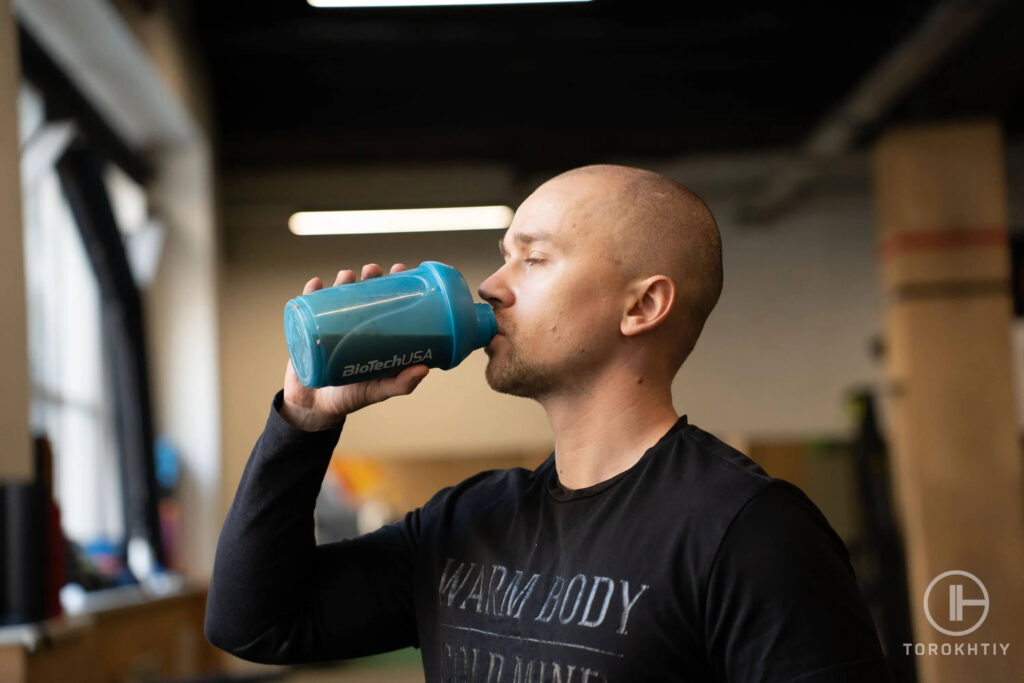
High-quality protein powders undergo additional testing and quality control measures to ensure that they are pure and free of contaminants. These additional steps can add to the cost of production.
Besides the cost of the main ingredient – protein, the price tag often shows packaging, marketing and shipping costs. Typically, protein powder businesses set their prices in accordance with what consumers are prepared to spend, and it so happens that some individuals are willing to spend a lot of money on protein supplements.
This is particularly true of protein supplements that are promoted by famous people and elite athletes. These costs are all passed down on the customer.
Other factors such as global economic trends, and climate change also influence the price.
1. How Much Does A Protein Powder Cost?
Prices typically range from $0.78 to $7.27 per serving, or from $23.75 to $89.99 for a container, however this might change depending on where you shop.
2. Production Costs Explained
Protein powders are concentrated sources of protein from either animal or plant foods. There are three main forms of protein powders:
- Protein concentrates generally include 60%–80% protein and may contain 20%–40% fat and carbohydrates. They are made by extracting the protein from foods with the use of heat, acid, or enzymes.
- Protein isolates have higher concentrations of protein – around 90% -95%. They are produced by removing fat and carb molecules from the concentrate by a thorough filtering process.
- Protein hydrolysates are made by further heating proteins with an acid or enzymes, which dissolves the bonds holding amino acids together.
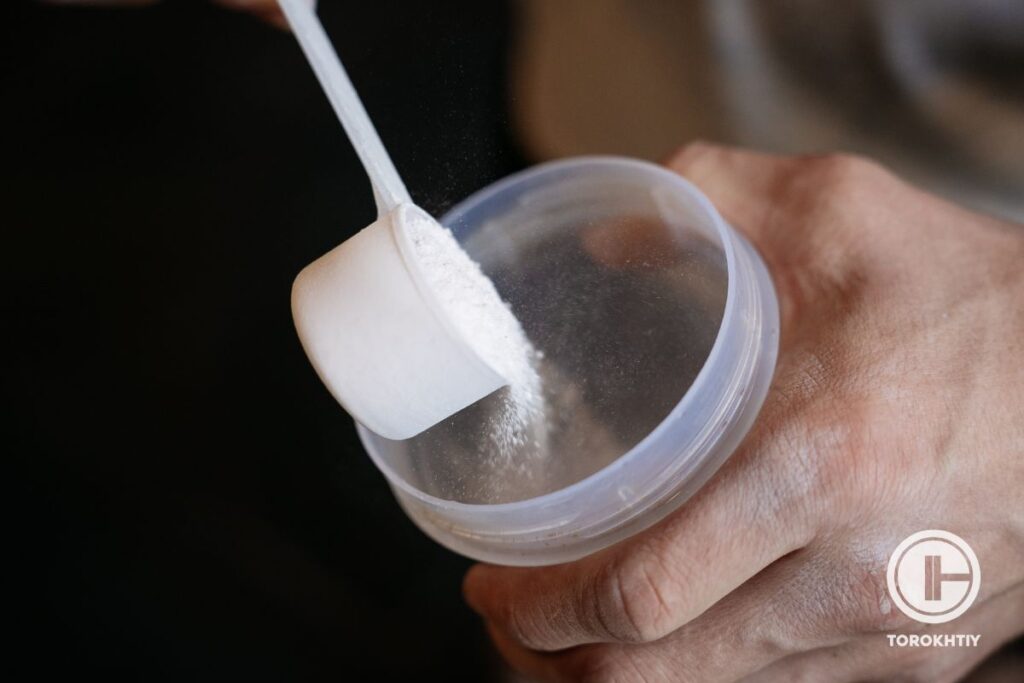
Production price for these three types of powders increases from 1 to 3, so hydrolysates are usually the most expensive on the market. There are some speculations that hydrolysates are the easiest to absorb and could help build the muscle faster.
Although, the results are not significantly different, and if you are willing to save up a little bit, you go for simple concentrate or isolated powders.
3. Inflation And Economic Crisis
Other objective factors that influence protein powder cost are global economy trends, pandemic, and even climate change.
The pandemic, war in the Ukraine, economic crisis, ingredient and labor shortages caused by these global processes had a huge impact on supply-chain disruptions. All these increased not only the cost of raw ingredients in protein powder production, but also the total price for manufacturing.
The above disruptions might pass over some time, but there is another factor that won’t go away any time soon – CLIMATE CHANGE. Whey protein powder, which is extracted from milk, greatly relies on the milk production prices.
Cost of whey protein has increased significantly lately, as it is more and more expensive to feed dairy cows and produce the same amount of milk at an increased temperature.
Cheap Protein vs Expensive Protein
As mentioned above, protein powder price varies roughly from $1 to $7 per portion. To help you make an informed choice, let’s discuss some differences that cheap and expensive powders may have.To give you a better understanding of how to compare cheap and expensive protein powders, there are two products discussed below, so keep reading.
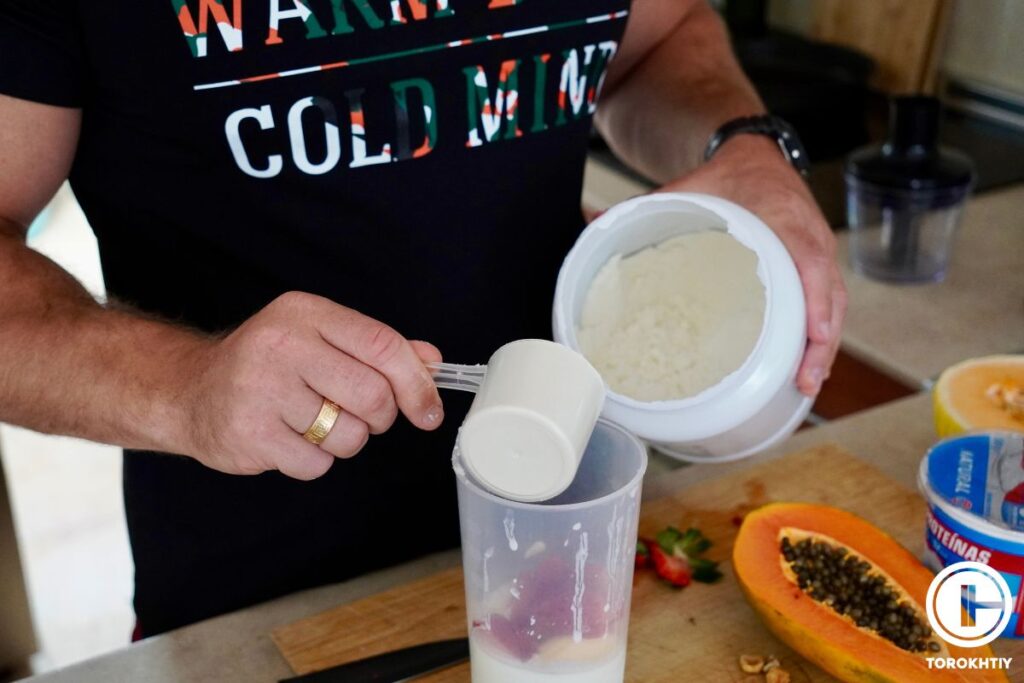
1. Protein Content
The amount and type of protein that the protein powder contains will have the most influence on its price. Plant-based proteins such as soy, pea, hemp and brown rice are cheaper to produce. Also, protein concentrates are usually cheaper than protein isolates and protein hydrolysates.
2. Additives
Supplements such as minerals and vitamins are often added to the protein powders, which is then shown on the price tag. Adding different flavors to make the consuming experience more pleasurable also increases the price.
3. Brands
Sometimes highly reputable brands price their products higher than others. It is not always obvious what is the consumer really paying for – the product quality or the name on the package? Both!
Big brands’ reputations are an asset in which they invest. For example, they undertake to guarantee the quality of their products, but at the same time, quality control significantly increases the cost.
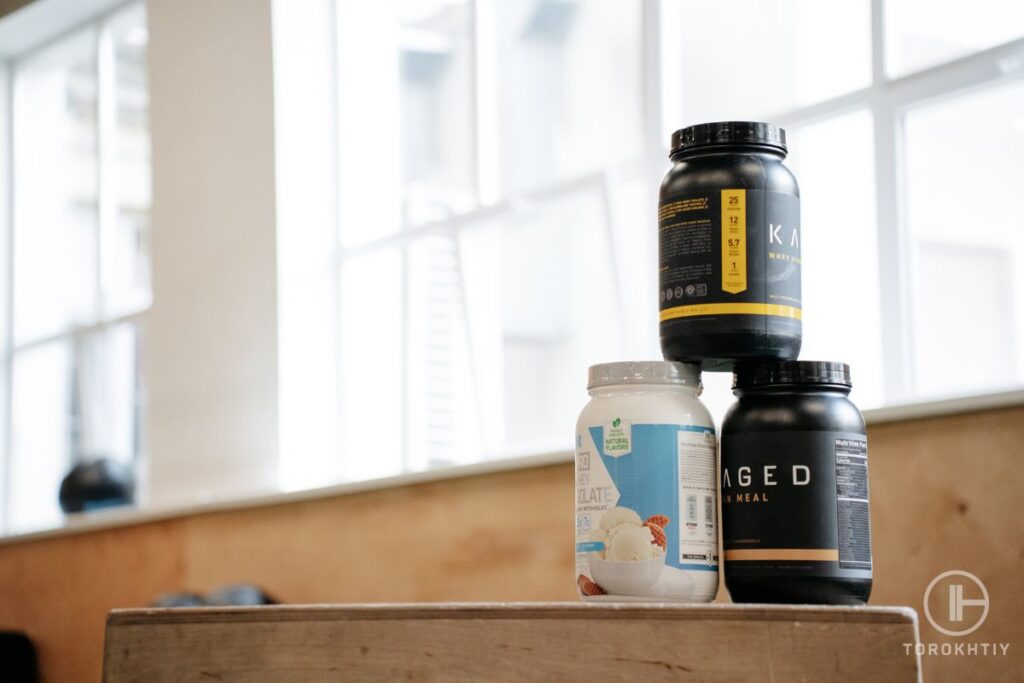
Most of the time big brands implement extra safety measures in their production process, like product testing for heavy metals and other toxic substances. Some of them also have trusted quality control certifications on their packaging. Of course, this will increase the overall price of the protein powder.
4. Comparing Cheap Vs More Expensive One
I have compared two good protein powders below. Try to use this guide to make an informed decision.
These two products can be used for the same purposes, which is building and maintaining the muscle and weight loss purposes. As seen, Whey protein isolate is slightly more expensive (per portion) than plant based protein powder (Orgain).
But if looked closer, the protein content is higher (per serving) in whey isolate (28 grams) than in plant-based one, which explains the higher price. Also, whey protein isolate has lower content of carbs and fats. So, if this is what you are looking for, then it’s worth paying slightly more.
Transparent Labs Whey Protein Isolate
- Serving Size: 32.96 grams
- Price Per Serving: ~$1.8
- Protein Percent Of Weight (%): 85%
- Proteins: 28 grams
- Carbohydrates: 1 gram (depends on flavor)
- Fat: 0.5 gram (French Vanilla only)
- Added Sugar: 0 gram
- Calories Per Serving: 120
- Recommended By Athletes: Hafþór Júlíus Björnsson, Terron Beckham, Paul Sklar
Protein has a higher thermic effect of food (TEF) compared to carbohydrates and fats, meaning its digestion consumes more energy, which is beneficial during a cut. For quality protein supplementation, Transparent Labs’ 100% Grass-Fed Whey Protein Isolate offers a clean and effective option.
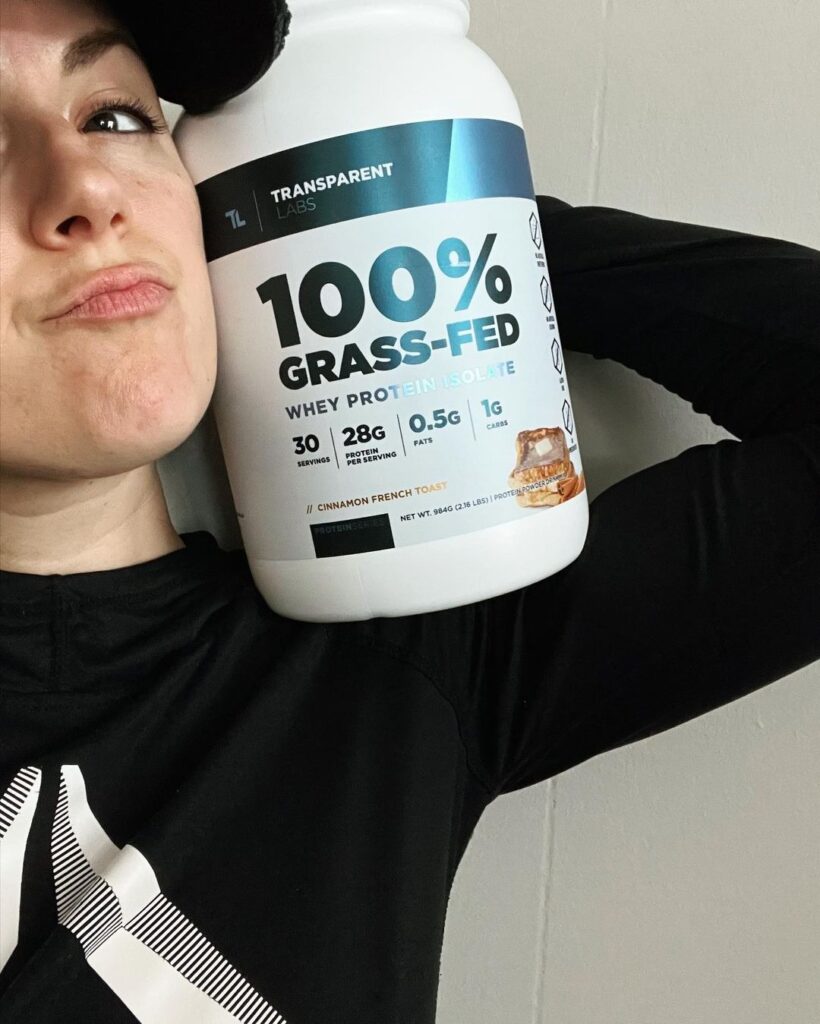
Orgain Organic Plant
- Diet Type (Best for): Vegan, Vegetarian
- Suitable For Vegans: Yes
- Protein Source: Plant protein blend (Pea and brown rice)
- Serving Size: 46 grams
- Price Per Serving: $1.50
- Protein % of Calories: 56%
- Proteins: 21 grams
- Carbohydrates: 15 grams
- Fats: 4 grams
- Sugars: 0 grams
- Company Founded: 2009
- Recommended by Athletes: Blake Griffin, Byron Jones
These products may be suitable for people with different lifestyles. For example, vegans will choose Orgain protein powder, as it’s purely plant-based. Also it does not contain soy which is important for people with intolerance or allergic reactions to soy.
On the other hand, whey protein isolate is an animal protein source, meaning that the amino acid profile from this product is usually better, if not declared otherwise.
4 Tips to Identify if The Cost Matches The Value
Based on the product reviews above, I hope you’ll be able to choose the most suitable protein powder for you. However, here are the five easy steps that will give you additional help to compare whether the price tag matches the value. Your wallet will thank me later:
1. Set Your Price Limits
Determine your budget: Before you start shopping, decide on a budget that you can comfortably afford. This will help you narrow down your options and prevent you from overspending.
2. Plant Based Or Not
If you are vegan or vegetarian, or trying to save the most on the protein powder, consider choosing plant-based options. On the other hand, for those wanting to consume a product with a better amino acid profile whey protein powder is the best option.
3. Read The Label
Read the label carefully and contrast the product’s nutritional information with those of other, more expensive options you are considering before selecting your next protein powder. You might possibly come across a good offer.
Are they comparable in terms of protein content? Is the protein used to make the product complete or incomplete? A high-quality product might have 70–90% protein, while a cheaper one would only have 30–40%.
4. The Brand
Price tags often reflect the brand’s reputation, but sometimes products are overpriced by the company’s marketing scheme. Try to find a balance between these, be critical and less influential.
Compare the prices of the similar protein powders and try to understand what is behind the higher costs. It could be better quality control or trustworthy certification that you don’t want to save on.
FAQ
Is Protein Powder Worth The Money?
Protein powder is a good and efficient source of protein for people that have specific fitness goals, or for those who simply cannot consume enough protein through food. The price can be quite affordable and the benefits are more than worth it.
How Much Does Protein Powder Cost?
Protein powder price varies depending on the protein content and type in the product, also whether there are any supplements added and the brand that produces the powder. Overall, the price per portion can be somewhere between $1-$7.
Conclusion
The cost of protein powder may vary because of multiple reasons. Knowing what could be behind the price tag is helpful to make an informed decision. Try using the 4 steps and comment below if it helped you choose wiser.
Also read:
- Does Protein Build Muscle Without Working Out
- What to Mix Protein Powder With
- How Many Protein Shakes a Day
- How to Make Protein Shakes Taste Better
- Can You Mix Creatine With Protein Powder
- Collagen Protein vs Whey Protein
- Whey Protein vs Pea Protein
- Muscle Recovery Supplements Guide
- What Is Condsidered Low Carb Protein Powder
- How To Make Protein Shakes Taste Better
- Whey Isolate Protein Guide
References:
- Nutritional Quality and Biological Application of Mushroom Protein as a Novel Protein Alternative // PMC: https://www.ncbi.nlm.nih.gov/pmc/articles/PMC10088739/
- The 8 Best Whey Protein Powders of 2023 // Jillian Kubala: https://www.healthline.com/nutrition/best-whey-protein-powder
- The role of protein hydrolysates for exercise-induced skeletal muscle recovery and adaptation: a current perspective // PMC: https://www.ncbi.nlm.nih.gov/pmc/articles/PMC8061049/
- Why is protein powder so expensive now? // Gene Bruno: https://www.nutrasciencelabs.com/blog/why-is-protein-so-expensive-now
- Impacts of Climate Change on Milk Production in the United States // The Professional Geographer: https://www.tandfonline.com/doi/abs/10.1080/00330124.2014.921017
- Photos made by Torokhtiy Media Team.
Why Trust Us?
With over 20 years in Olympic weightlifting, strength training, nutrition coaching, and general fitness our team does its best to provide the audience with ultimate support and meet the needs and requirements of advanced athletes and professional lifters, as well as people who strive to open new opportunities and develop their physical capabilities with us.
By trusting the recommendations of our certified experts in coaching, nutrition, and sports training programming, as well as scientific consultants, and physiotherapists, we provide you with thorough, well-considered, and scientifically proven content. All the information given in the articles concerning workout programming, separate exercises, and athletic performance, in general, is based on verified data.
The product testing process is described in more detail here.
Author: Oleksandr Maksymenko
Certified Sports Nutritionist,
MSc Sports Dietetics
Specializing in: Weight management, Fitness / Sports nutrition
Oleksandr is a professional fitness nutritionist certified by the Fitness Professional Association (FPA). He follows the principles of evidence-based dietetics and fosters a healthy relationship with food in his clients, ensuring there are no strict prohibitions on their favorite foods or frequent lapses. His primary goal is not only to achieve results for you but also to sustain them over the long term, all while enjoying tasty and delicious food.



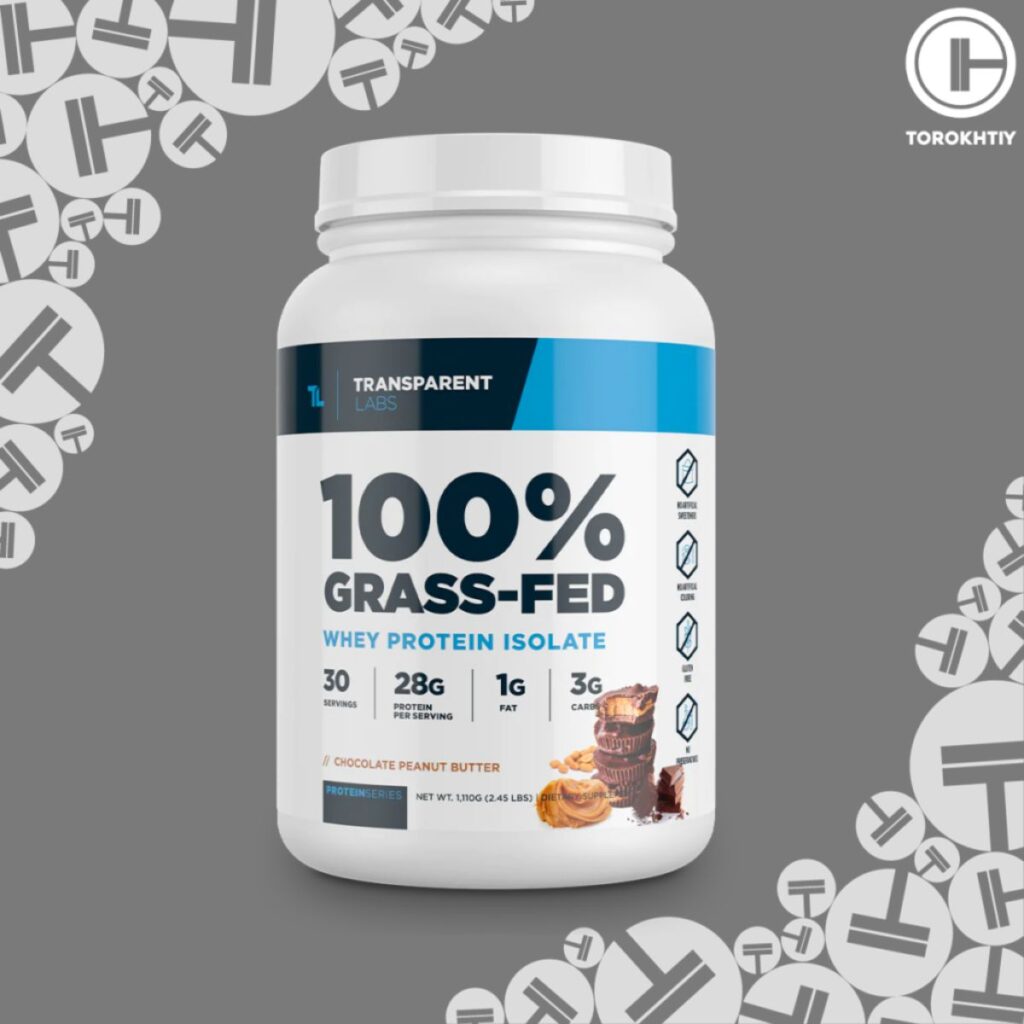
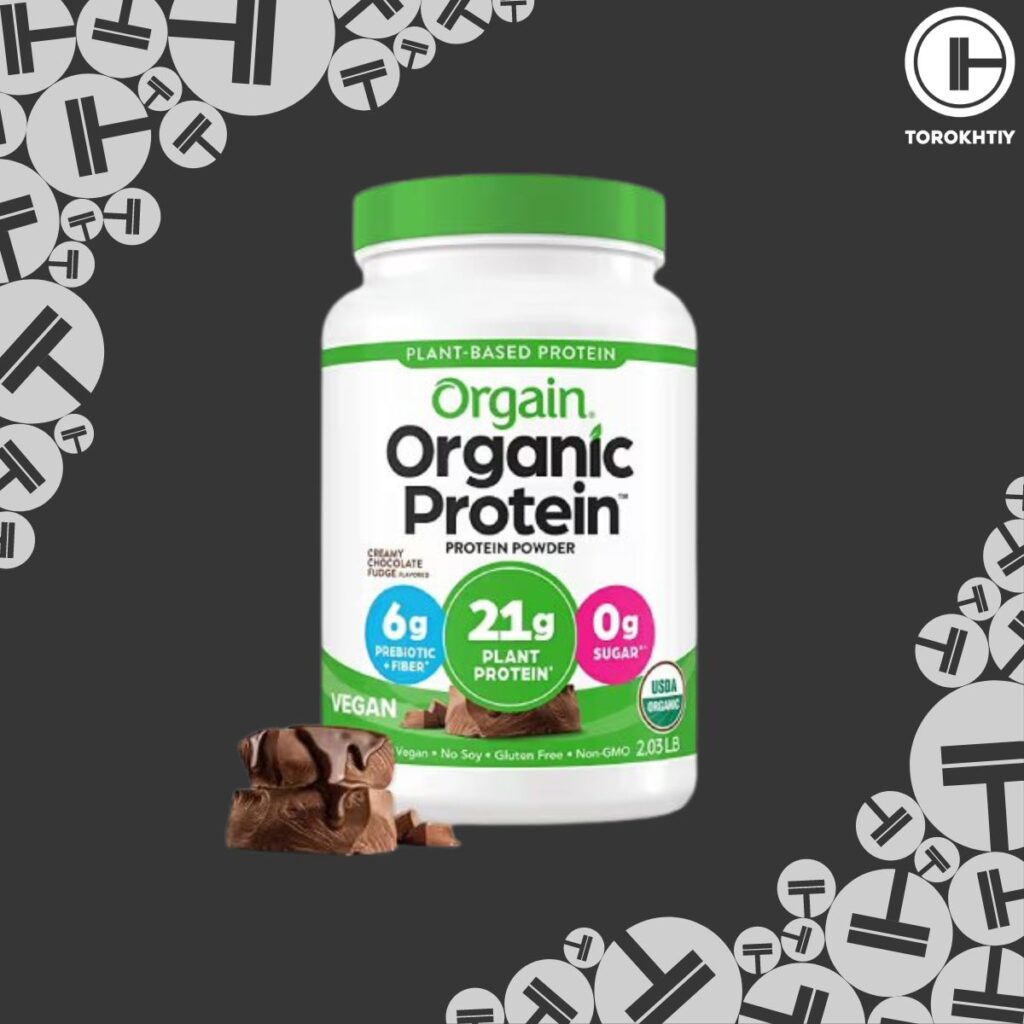
Still have questions after reading our article? Unlock your full potential by engaging with our experts and community! Don’t hesitate — leave a comment below and Oleksandr Maksymenko will provide a personalized answer and insights to help you reach your goals.